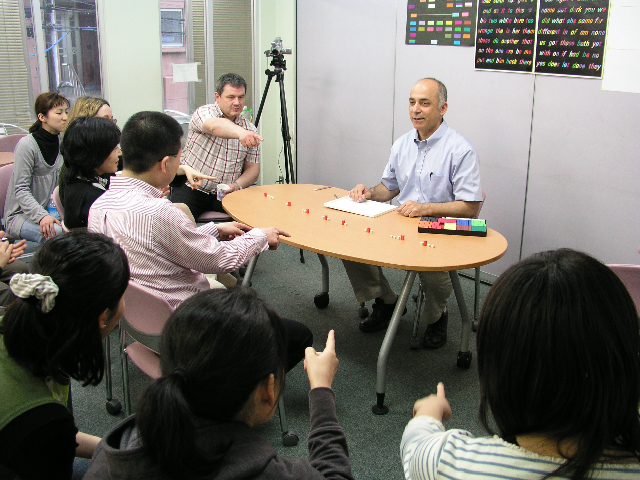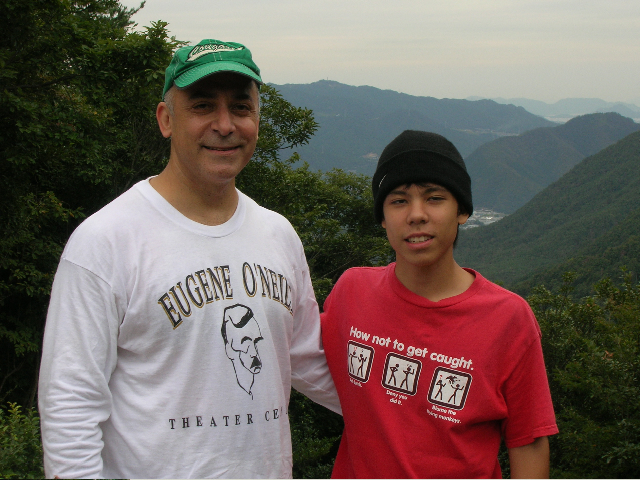
Summer 09
Posters at TALGS
From the Heart
Why Are You Smiling?
Achievement Profile: Donald Cherry
Preserving Heritage Language
![]()
/Index/
/Letters/
/Profiles/
/Search/
/Podcasts/
![]()
Subscribe
for free!

Donald Cherry
From Assyria to Japan via Chicago
1. What is your main ESL activity now?
I am a junkyohju, which is something between a hobbit and a leprechaun. Sorry. I mean, I AM a junkyohju, but it’s nothing to do with hobbits and leprechauns. Not strictly speaking, anyway. It’s Japanese, and I guess it can be translated as “associate professor.” Something like that. I am one, and I work at Hiroshima International University, which I mistakenly thought was in Hiroshima, which it is, but not the city, the prefecture, which is about $10 and 90 minutes from Hiroshima City. I found this out the hard way when I showed up for the interview, but I won’t waste space here with the story of that bus ride over the mountains on a two-lane road that actually had at one point a sign with a silhouette of a wild boar, I suppose directing the local wild boars to a crossing there, or maybe some sort of club.
In addition to my teaching at Hiroshima International University, I teach intensive Silent Way ESL courses in Tokyo organized by a group called Silent Way Tokyo (http://sites.google.com/site/gaandsw/). I have been working with the Silent Way teaching approach for about 15 years now, and have a website with some information about it at http://donaldcherry.com/silentway/.
2. How did you start your ESL related career?
As a carpenter, but I never got around to hammering or sawing anything. That was my intent, though, as I entered the front door of the Heart of Uptown Coalition, a community organization in the Chicago’s Uptown neighborhood with a People’s Law Center, a Learning Center, and various other centers and programs all bustling away in an unassuming building two blocks from my apartment. I went in and asked them if they had a program to help rehabilitate some of the abandoned buildings in the neighborhood and turn them into low-income housing for neighborhood residents. I figured I could also learn a building trade in the process. You know, sort of like a three birds with one stone kind of thing.
Well, they didn’t have such a program, and I watched my stone sail into the unbroken blue sky. But they said it sounded like a great idea, and would I in the meantime volunteer to help kids with reading skills? Yeah, I suppose, and before you knew it I was working with a kid once or twice a week, then later with a clutch of about eight kids. I eventually wound up in a Korean church on Lawrence Avenue telling the assembled there that I positively loved communism.
Uh, let me explain.
See, the Chicago City Colleges started partially funding the program at the Heart of Uptown, and I got to know people at Uptown’s city college, Truman College, and they started having me fill in for teachers who were sick. These teachers often taught off-campus, at places like Korean churches, Russian senior citizen centers, city libraries. I still was not learning a building trade, and I was still passing homeless people and abandoned buildings, but I was making $10.50 per hour, and occasionally shared some of this with a homeless person. Anyway, that’s how I wound up at the church on Lawrence Avenue.
Now about the communism part. It was a perfectly pleasant break we were all having, me and the 30 or so Koreans at this church. We were having coffee, smiling at one another, and so we attempted conversation. It was here where the trouble began. See, I thought they had asked me if I liked COMEDY, which I certainly do, and I responded with a big, fat, enthusiastic “yes!” Imagine my surprise when they all frowned back at me, and one girl started sort of crying. Well, first imagine their surprise when they ask someone not more than 20 feet from a life-size crucifix if he likes communism, and he positively lights up and bellows, “Yes!” Then, seemingly puzzled by the resulting shock and dismay, he does not diplomatically drop the subject, but rather grows more strident, as if doing so will somehow overcome the growing horror. “No, no, you see I LOVE communism! Understand? Communism! I love it!” Well, someone finally took out a dictionary, and we got it sorted out, but the damage had been done. Their peninsula had been divided, their break ruined, the church possibly damned for all time, and we still had an hour and a half left.
The rest of the story is comparatively uneventful. A Japanese company came to Chicago interviewing for teachers, I borrowed a skinny friend’s suit and held my breath for an entire 45-minute interview, worked in Japan for three years, quit smoking, returned to the U.S. and lived in a tent for a while with my wife, got a master’s degree at the School for International Training, went back to Japan, moved around a bit, had two kids (not at the same time, and not by myself), started smoking again, quit smoking again, and wound up here, in downtown Hiroshima, a fifty-minute drive from the only wild boar crossing sign I have ever seen in my entire life.
3. What are some of the language/culture backgrounds with which you are most familiar?
My wife is Japanese. That’s what she says, anyway. You never know, and in the end, or the beginning, we’re all from Africa, right? But for the time being, let’s assume my wife is what she says she is. Japanese. Add to this my 18 years in Japan, and I’d have to say I am probably most familiar with the language and culture of Japan.
Next would be the ancient culture of Assyria. Sort of. My Assyrian grandparents came to the U.S. from northwestern Iran in 1921 in a wave of Assyrian immigration that followed the Turkish massacre of Assyrians during World War I. I was born and spent the first years of my life in an Assyrian neighborhood. My aunts, uncles, cousins and grandparents lived in the same big apartment building on Olive St. My grandparents spoke to my mother in Assyrian. She answered in English. Me, I just learned the words for some Assyrian foods and, curiously, the one for “lazy.” So, while I am not truly expert in Assyrian culture and language, I did get used to not understanding what people were talking about and funny-smelling food, two things that have served me very well in the years that followed.
4. If you had to give three pieces of advice to a new teacher working with English language learners, what would these be?
#1 Be advised that advice grows out of someone else’s experience, and is sometimes meaningful only to the person giving the advice.
#2 Be brave. Try new things and make lots of mistakes.
#3 Always carry a handkerchief.
5. What do you see as the most important issues facing the ESL/EFL language teaching profession today?
The idea of listing the MOST important issues is a little daunting. Also, I tend to think of issues facing me rather than the profession, but that’s perhaps a personal failing. Nevertheless, I think that one of the most important issues facing the profession is poor employment conditions, including low pay and an over reliance by schools on adjunct part-time faculty.
2009 ESL MiniConference Online
PDF conversion by PDF Online

Professor Donald Cherry teaches Gattegno's Silent Way
Donald Cherry and son, Lenny
Interview by Robb Scott
Robb@ESLminiconf.net